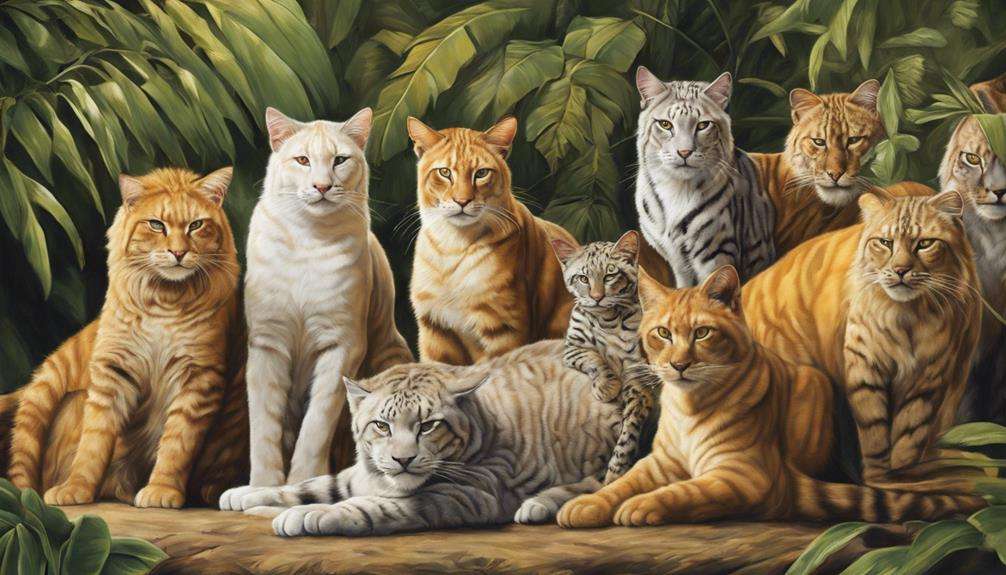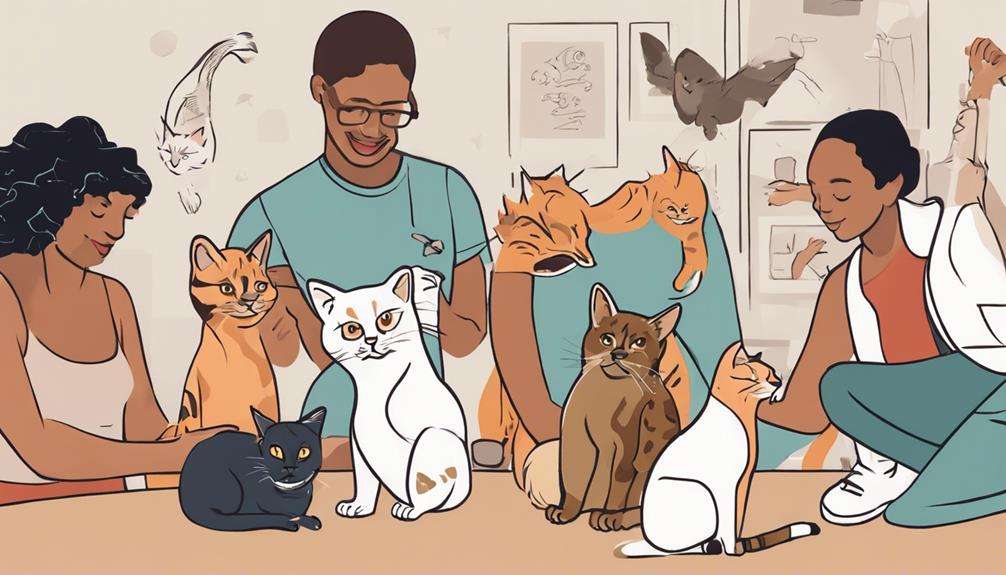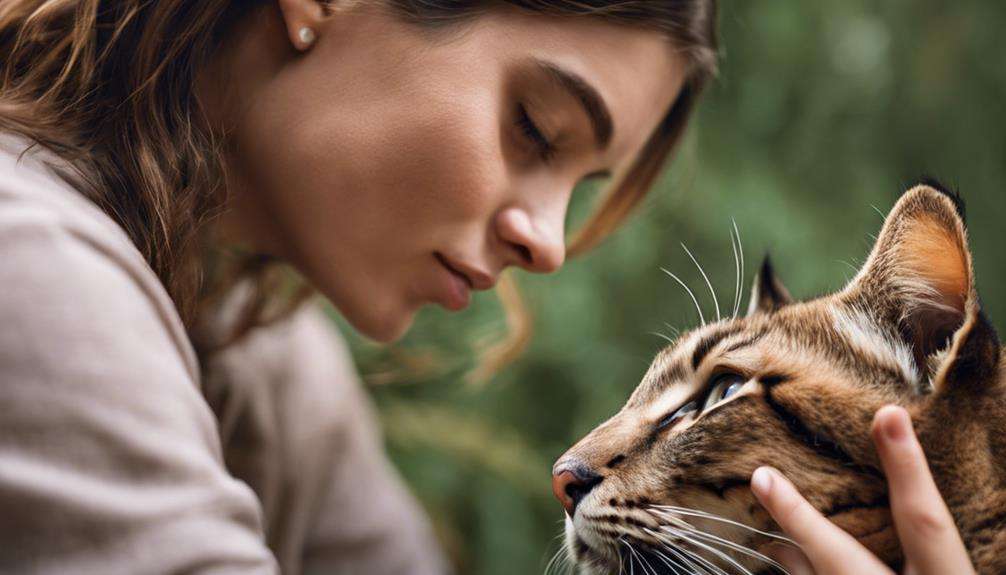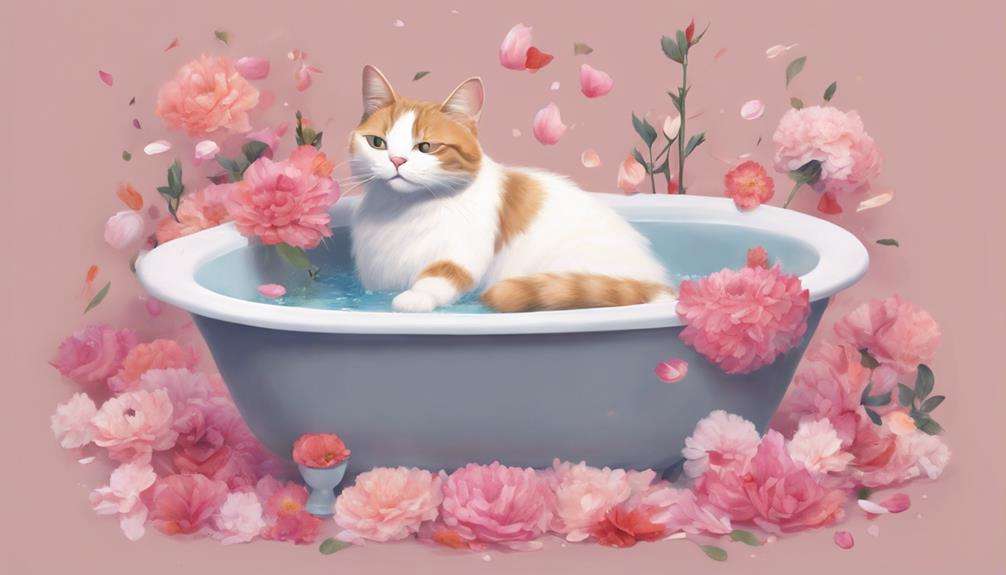Did you know that over 60% of exotic feline owners struggle with providing adequate care due to a lack of comprehensive resources? Understanding the nuances of caring for these majestic animals can be challenging, but fear not, as an innovative care guide has emerged to address this gap.
With a focus on unique dietary considerations, enriching environments, and veterinary insights, this guide offers a holistic approach to exotic feline care. Stay tuned to uncover valuable tips and insights that can transform your approach to caring for these magnificent creatures.
Key Takeaways
- Tailored raw meat diets with essential supplements are crucial for exotic feline health.
- Mimicking natural habitats and providing enrichment promotes well-being.
- Understanding social dynamics and behaviors is vital for optimal care.
- Long-term commitment to specialized care ensures happiness and health.
Unique Dietary Considerations for Exotic Felines
When caring for exotic felines, it's essential to understand their unique dietary requirements to ensure their optimal health and well-being. Exotic felines, such as serval cats, have specific dietary needs that differ from common domesticated cats. These majestic creatures require a balanced diet consisting of raw meat, bones, and organs to replicate their natural prey. Nutritional supplements like taurine and essential fatty acids play a crucial role in maintaining the health of exotic felines.
It's paramount to avoid feeding them processed or cooked foods, as these may lack the essential nutrients vital for their well-being. Each species of exotic feline, along with factors like age and health conditions, necessitates tailored meal plans to meet their specific dietary requirements. To ensure that these needs are appropriately met, consulting with a vet or an exotic animal nutritionist is highly recommended.
Enriching Environmental Setup for Exotic Felines
To ensure the optimal health and well-being of exotic felines, it's crucial to create carefully controlled habitats that cater to their specific environmental requirements. Mimicking the natural environment is vital for these magnificent creatures.
Here are some key points to consider when enriching the environmental setup for exotic felines:
- Specific Temperature: Exotic felines, like the African Serval Cat, require environments with precise temperature control to mimic their native habitats accurately.
- Lighting Conditions: Providing suitable lighting conditions, including UVB lighting for reptiles like serval cats, is essential for their overall well-being.
- Humidity Levels: Maintaining appropriate humidity levels is crucial, especially for species that thrive in humid environments.
- Natural Elements: Incorporating natural elements such as rocks, logs, and plants can help create a stimulating and enriching environment for exotic felines.
Understanding Social and Behavioral Patterns

Understanding the social and behavioral patterns of exotic felines is key to promoting their well-being and happiness. Exotic pets, such as serval cats, have specific needs that must be met to ensure their mental health and overall quality of life. Some exotic felines may benefit from companionship to thrive and maintain optimal well-being. By comprehending the social dynamics and behavior patterns unique to each species, caretakers can create environments that cater to the specific needs of these animals.
Neglecting the social needs of exotic felines, like servals, can lead to stress and behavioral issues that may impact their overall welfare. Meeting the social and behavioral needs of these exotic pets is essential for providing them with an enriching and fulfilling life. Observing their interactions, understanding their communication cues, and offering appropriate outlets for socialization are crucial aspects of caring for exotic felines. By prioritizing their social and behavioral requirements, you can create a harmonious environment where these magnificent animals can thrive.
Long-Term Commitment to Exotic Feline Care
Caring for exotic felines involves a long-term commitment to providing them with enriched habitats, tailored behavioral strategies, and thorough health monitoring. These essential components ensure that the unique needs of exotic felines are met, promoting their overall well-being and happiness.
Feline Habitat Enrichment
Enhancing the habitat of exotic felines with a variety of stimulating elements is essential for their long-term well-being and contentment. When caring for these unique animals, consider the following to enrich their environment:
- Varied Environments: Create different spaces with climbing structures and hiding spots to mimic their natural habitats.
- Interactive Toys: Provide toys that encourage play and mental stimulation, such as puzzle feeders or feather wands.
- Sensory Stimulation: Incorporate scents, sounds, and textures to engage their senses and prevent boredom.
- Rotation of Enrichment: Regularly change and update the enrichment items to keep the felines engaged and prevent habituation.
Behavioral Enrichment Strategies
To ensure the long-term well-being of exotic felines, incorporating behavioral enrichment strategies is vital for their overall health and happiness. Exotic felines have unique needs that must be met to prevent boredom and behavioral issues.
Providing mental stimulation through toys, puzzles, and interactive feeders can keep them engaged and satisfied. Additionally, offering a variety of climbing structures, hiding spots, and perches can mimic their natural habitat, promoting physical activity and mental well-being.
It's essential to rotate toys and enrichment activities regularly to maintain their interest and prevent monotony. Tailoring enrichment activities to cater to the feline's species-specific behaviors and preferences ensures they lead a fulfilling and enriched life.
Health Monitoring Protocols
Regular health check-ups and monitoring protocols are essential for ensuring the long-term well-being of exotic felines. To achieve this, consider the following:
- Develop a comprehensive health record system: Keep track of vaccinations, deworming, and medical treatments.
- Utilize diagnostic tools: Use blood tests, fecal exams, and physical exams to detect health issues early.
- Collaborate with experienced veterinarians: Establish tailored health care plans for your exotic felines.
- Prioritize preventive care: Ensure parasite control, dental care, and a diet rich in essential nutrients to maintain overall health.
Taking these steps shows your long-term commitment to providing the best care for your exotic feline companions.
Veterinary Insights for Exotic Felines
Securing a knowledgeable veterinarian familiar with handling exotic felines' unique medical needs is vital for ensuring their optimal health and well-being. Given the special dietary needs and specific care requirements of exotic felines, finding a specialist veterinarian can be challenging. Regular check-ups and immediate medical attention are crucial for maintaining their health.
Not all veterinarians possess the necessary expertise to treat exotic felines, highlighting the importance of seeking specialized care. It's advisable to locate a qualified exotic animal vet before bringing an exotic feline into your home to ensure proper veterinary support from the start.
Additionally, joining communities of exotic pet owners can provide valuable support, shared resources, and advice on veterinary care for exotic felines. By prioritizing expert veterinary care and seeking guidance from fellow exotic pet owners, you can help your unique feline companion live a healthy and fulfilling life.
Education and Support for Exotic Feline Owners

When caring for exotic felines, it's essential to educate yourself through owner education programs that offer valuable insights into their unique needs.
Joining virtual support groups can connect you with a community of experienced owners and provide a platform for sharing resources and seeking expert advice.
Additionally, having access to a care resources directory can help you navigate the complexities of meeting your exotic feline's specific requirements.
Owner Education Programs
Owner education programs play a crucial role in equipping exotic feline owners with the necessary knowledge and support to ensure the well-being of their unique pets. These programs provide valuable information on the specific care requirements of exotic felines, such as African Serval cats. They offer guidance on topics like diet, habitat, behavior, and medical care, tailored to these unique creatures.
Virtual Support Groups
For those caring for exotic felines, virtual support groups offer tailored education and invaluable support. These groups provide a platform where you can connect with other exotic feline owners to share experiences, resources, and advice.
By joining these virtual support groups, you gain access to valuable information on diet, health, behavior, and other essential aspects of caring for your exotic feline. Interacting with like-minded individuals and experts in the field can help you better understand the specific dietary needs and requirements of your exotic feline companion.
These groups play a crucial role in creating a supportive community that fosters learning opportunities for exotic feline owners, ensuring that you have the resources necessary to provide the best care for your unique pet.
Care Resources Directory
In the realm of caring for exotic felines, finding reliable resources and a supportive community is crucial for ensuring the well-being of your unique pet. When it comes to caring for exotic animals, having access to specialized care resources is essential. Here are some key features of the care resources directory tailored for exotic feline owners:
- Directory includes resources for education and support specifically tailored for exotic feline owners.
- Provides information on diets, training, housing, and veterinary care for exotic felines.
- Essential resource for those looking to properly care for African Serval cats and other exotic felines.
- Offers guidance on meeting the unique needs of exotic felines to ensure their well-being.
Accessing this directory will assist you in understanding and meeting the social, behavioral, and health requirements of your exotic feline companion.
Frequently Asked Questions
How Do You Take Care of an Exotic Cat?
To take care of an exotic cat, ensure you meet its dietary requirements, provide enriching activities, cater to its exercise needs, and use proper grooming techniques. Your commitment to these aspects ensures a healthy and happy feline companion.
What Special Care Do Exotic Animals Need?
To care for exotic animals, you must understand their specific needs. Enrichment activities and proper nutrition are key. Behavioral training and environmental enrichment support their well-being. Seek expert care and connect with exotic pet communities for advice.
What Is the Lifespan of an Exotic Cat?
In the world of exotic cats, the African Serval typically boasts an average lifespan of around 20 years. Meeting their dietary requirements and providing proper care and attention are key to ensuring a long, healthy life.
Do Exotic Shorthairs Need Baths?
You don't need to bathe Exotic Shorthairs often. Their short coats repel dirt. Only bathe if necessary, like for skin issues or shows. Over-bathing can harm their skin. Regular grooming with a brush helps maintain cleanliness.
Conclusion
In conclusion, caring for exotic felines requires dedication and a deep understanding of their unique needs.
By providing enriching environments, quality nutrition, and compassionate veterinary care, you can ensure the well-being of these magnificent creatures.
Remember, being a responsible exotic feline owner means committing to their long-term care and seeking education and support along the way.
Your efforts in caring for these special animals won't go unnoticed, as they bring joy and fulfillment to your life.






